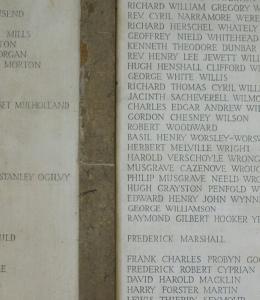Died aged 50
Buried in Corsham, Wiltshire
John Michael Fleetwood was the eldest son of George Fuller of Neston Park, Corsham, Wiltshire and his wife Emily Georgina Jane daughter of Sir Michael Hicks Beach 8th Bt.
He was educated at Winchester College and Christ Church, Oxford. In 1887 he obtained third-class honours in history and was a polo blue. On a world trip in 1891 he spent a few weeks in Australia, moving in vice-regal circles, and in 1894-95 he was aide-de-camp to the Viceroy of India.
In 1898, he married the 19-year-old Norah Jacintha Phipps, they had two sons and four daughters
He went on to be a Chartered Accountant and, unsuccessfully, contested Parliament three times, but in 1900 he was successfully returned for Westbury. A Liberal, he served under Campbell-Bannerman as a Junior Lord of the Treasury from 1906 to 1907 and under Campbell-Bannerman, and later H. H. Asquith, as Vice-Chamberlain of the Household from 1907 to 1911. He was created a Baronet in 1910 and was made a KCMG in the Coronation Honours in 1911. In 1912, he resigned his seat in the House of Commons on his appointment as Governor of Victoria. He arrived in Melbourne on 24 May with his wife and children.
The Times, 14 January 1913, declared of Australians that 'A Governor of the right sort educates them, widens their views, eliminates their provincialisms, keeps them in touch with the Empire and the world. As Long as Great Britain sends out Governors who can do this, the most benighted and thrifty Australian will not grudge the expense or chafe at the ceremonialism'. Fuller, however, admitted 'I went to Melbourne much in the manner the “new boy” approaches his public school. I knew practically nothing of Australian life. When I got there I found it was impossible to know anything from merely English experience’. He remained in this position until his resignation for health and family reasons in November 1913.
Fuller had described himself to an Australian interviewer as 'just an ordinary type of English country gentleman and a good sportsman … fond of hunting, shooting, stalking and the rest'; he had a reputation as an active politician, and a 'cheerily stubborn Liberal'. While he performed his duties amiably, there were minor controversies in office. In April 1913 he was reprimanded by the Minister for External Affairs for supposedly interfering in Federal matters by publicly suggesting the dispatch of an expedition to rescue Douglas Mawson in the Antarctic.
In July 1913 the Argus replied to Fuller's disappointment that his speeches were not proving good newspaper copy: 'His sense of humour' was more developed than 'his gift of humour'. Fuller had difficulties with the Colonial Office over permission to escort his wife back to England where she had settled three daughters at school. Three months' leave was later allowed and Fuller left Melbourne on 27 August 1913. An accident prevented him from returning to Melbourne with Lady Fuller, and on 24 November his resignation for health and family reasons was announced. He died at his home, Cottles Park, Atworth, Wiltshire, on 4 September 1915. His funeral was held five days later.
He was a Major in the Royal Wiltshire Yeomanry and an Honorary Colonel in the 19th Australian Light Horse,
Source: Australian Dictionary of Biography


